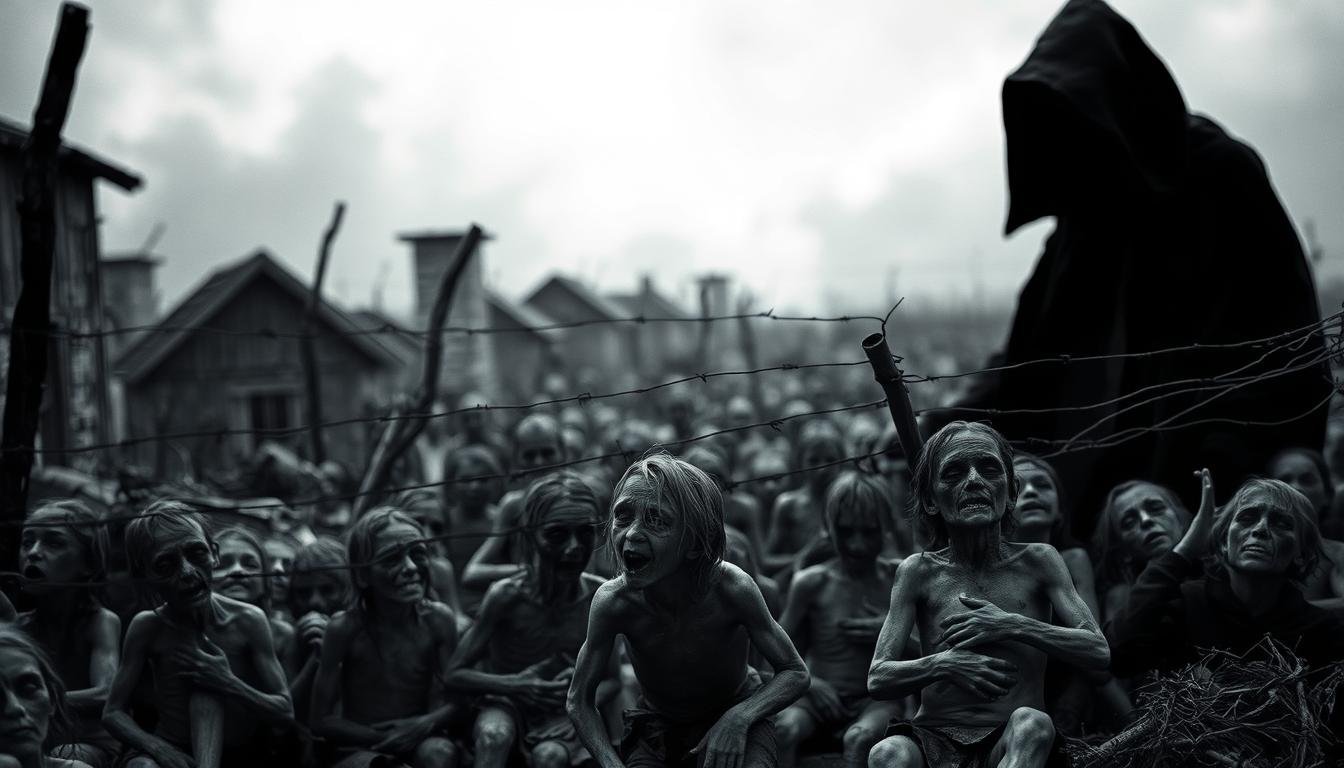You might have heard about the Holocaust’s horrors. But knowing why Hitler hated Jews is key to understanding this dark time.
The Holocaust was a Nazi plan to kill Jews, leading to a horrific genocide. As you learn more, you’ll see Hitler’s hatred came from anti-Semitic views, political goals, and social issues.
Learning about Hitler’s hatred helps us avoid such tragedies in the future. You’ll see how different factors led to the violence and the Holocaust’s devastating effects.
Contents
- 1 The Historical Context of European Antisemitism
- 2 Hitler’s Early Life and Formative Influences
- 3 Why Did Hitler Hate the Jews? Examining His Core Beliefs
- 4 The Rise of Nazi Propaganda Against Jews
- 5 From Discrimination to Genocide: The Evolution of Nazi Policy
- 6 Psychological and Sociological Perspectives on Hitler’s Hatred
- 7 The Global Impact of Hitler’s Antisemitism
- 8 Conclusion: Learning from History’s Darkest Chapter
- 9 FAQ
- 9.1 What were the main factors that contributed to Hitler’s hatred of Jews?
- 9.2 How did the historical context of European antisemitism contribute to Hitler’s beliefs?
- 9.3 What role did propaganda play in amplifying Hitler’s hatred and the Nazi’s antisemitic agenda?
- 9.4 How did Nazi policies against Jews escalate from discrimination to genocide?
- 9.5 What can we learn from the psychological and sociological factors that contributed to Hitler’s hatred?
- 9.6 What was the global impact of Hitler’s antisemitism?
- 9.7 Why is it essential to remember the Holocaust and learn from history?
The Historical Context of European Antisemitism
European antisemitism has deep roots, going back centuries. The history of antisemitism is complex, shaped by many factors over time.
It was fueled by religious, economic, and social issues. Key events and periods include:
- The Middle Ages, where Jews faced blame for economic troubles and persecution.
- The Crusades, leading to violent attacks on Jewish communities.
- The rise of nationalism and false scientific theories that deepened antisemitic views.
These events helped Hitler’s antisemitism grow. Knowing European antisemitism’s history helps understand Hitler’s extreme views.
The legacy of European antisemitism warns us about unchecked hatred and prejudice. As you delve deeper, you’ll see why learning from history is key to preventing future atrocities.
Hitler’s Early Life and Formative Influences
Hitler’s early years were key in shaping his hatred for Jews. Born in Austria in 1889, his family was marked by conflict and instability. His father, Alois Hitler, was strict and often moved, affecting young Adolf’s life.
Hitler was exposed to antisemitic ideas early on. The cultural and political climate of early 20th-century Vienna, where he spent several years, was particularly significant in shaping his views. Vienna’s strong antisemitic atmosphere, fueled by politicians and writers, deeply influenced Hitler.
| Influence | Description | Impact on Hitler |
|---|---|---|
| Family Environment | Conflict-ridden and unstable | Contributed to his aggressive worldview |
| Vienna’s Antisemitic Climate | Prevalent antisemitic discourse | Shaped his antisemitic beliefs |
| Political and Cultural Exposure | Exposure to nationalist and antisemitic ideas | Reinforced his hatred for Jews |
Understanding these influences is key to understanding Hitler’s hatred for Jews. By looking at his early life and the factors that shaped his beliefs, we can learn about one of history’s darkest times.
Why Did Hitler Hate the Jews? Examining His Core Beliefs
To grasp why Hitler loathed Jews, we must delve into his beliefs and their roots. His core beliefs were key in shaping Nazi propaganda and ideology, especially their hatred for Jews.
Hitler’s disdain for Jews stemmed from a blend of historical, cultural, and personal reasons. The Nazi ideology was deeply rooted in antisemitism. This ideology both reflected and fueled the widespread hatred towards Jews in Europe.
| Core Belief | Description | Impact on Nazi Ideology |
|---|---|---|
| Antisemitism | Hatred towards Jews based on historical and cultural prejudices | Shaped Nazi propaganda and policies against Jews |
| Racial Purity | Belief in the superiority of the Aryan race | Led to policies aimed at eliminating “inferior” races, including Jews |
| Scapegoating | Blaming Jews for Germany’s problems | Justified persecution and violence against Jews |
Understanding Hitler’s core beliefs helps us see why he hated Jews so much. It also sheds light on the genocide that followed. By looking into these beliefs, we can better comprehend one of history’s darkest periods.
The Rise of Nazi Propaganda Against Jews
Hitler’s power grew, and so did the Nazi propaganda machine. It played a big role in spreading his hatred towards Jews. The Nazi regime used many media to share antisemitic ideology. This created a climate of fear and hatred everywhere.
Through posters, radio, and films, the Nazis showed Jews as a threat. They blamed Jews for Germany’s economic and social issues. This made Jews seem like enemies to many Germans.
The propaganda worked well in changing how people thought about Jews. It made Jews seem less human and different. This made it okay to discriminate and even hurt Jews.
This campaign was key to Hitler’s plans. It helped him put his antisemitic policies into action. It was a big part of his strategy.
The Nazi propaganda didn’t just affect Germany. It also changed how people thought about Jews in occupied Europe. As the Nazis took more land, their propaganda spread. This helped lead to the tragic events of the Holocaust.
From Discrimination to Genocide: The Evolution of Nazi Policy
The Nazi party grew in power, changing their laws against Jews from unfair to deadly. At first, they made laws like the Nuremberg Laws in 1935. These laws took away Jews’ citizenship and stopped them from marrying outside their race.
As the Nazis got bolder, their actions got worse. The establishment of concentration camps was a big step. Jews and others were locked up in bad conditions.
Concentration Camps and Death Camps
Death camps, like Auschwitz, were built for killing on a huge scale. They used gas chambers and other cruel ways to kill millions. The Nazis were very good at killing, showing how evil they were.
The Nazis’ shift from unfair laws to genocide is a scary lesson. It shows what happens when hate and prejudice are ignored. We must learn from this to stop such horrors from happening again.
Looking at how the Nazis went from unfair laws to genocide helps us understand their evil. The Holocaust teaches us to always watch out for hate and intolerance.
Psychological and Sociological Perspectives on Hitler’s Hatred
Hitler’s deep hatred for Jews came from a mix of psychological and sociological factors. His antisemitic views might have been influenced by personal experiences and traumas.
The post-World War I Germany situation also played a big role. It had economic troubles and social unrest. This made antisemitic feelings seem more normal.
| Perspective | Factors Influencing Hitler’s Hatred | Impact |
|---|---|---|
| Psychological | Personal traumas, individual biases | Shaped extreme antisemitic views |
| Sociological | Economic conditions, societal unrest | Normalized antisemitism among the population |
Both psychological and sociological elements were key in Hitler’s hatred. Knowing about these can help us understand how to stop such hatred in the future.

The Global Impact of Hitler’s Antisemitism
Hitler’s hate for Jews had far-reaching effects around the world. It changed how countries relate to each other and how we protect human rights. This is seen in how the world deals with genocide and human rights issues after World War II.
The Holocaust impact wasn’t just on Jews; it changed global politics and social norms. The world united to form the United Nations. The Universal Declaration of Human Rights was also created to stop such horrors.
Today, Hitler’s hate serves as a warning about the dangers of hate and discrimination. It shapes today’s talks on human rights, stopping genocide, and working together globally.
Conclusion: Learning from History’s Darkest Chapter
You’ve learned about Hitler’s deep hatred for Jews. This hatred came from many sources, including history, personal feelings, and beliefs. Understanding the Holocaust is key to stopping future genocides.
Remembering the Holocaust teaches us about the dangers of hate and prejudice. It’s important to spot signs of rising antisemitism and intolerance. This helps build a world based on peace, understanding, and respect.
By learning from history, we can prevent such tragedies from happening again. We must promote tolerance, fight against hate, and stand up for justice. The Holocaust’s memory should motivate us to work towards a kinder, fairer world.
FAQ
What were the main factors that contributed to Hitler’s hatred of Jews?
Hitler’s hatred of Jews came from a mix of historical antisemitism, his early life, and Nazi ideology.
How did the historical context of European antisemitism contribute to Hitler’s beliefs?
The long history of antisemitism in Europe helped Hitler’s extreme views. It made his hatred seem normal to many.
What role did propaganda play in amplifying Hitler’s hatred and the Nazi’s antisemitic agenda?
Propaganda was key for the Nazis. It made Jews seem evil, spreading fear and hatred. This helped lead to the Holocaust.
How did Nazi policies against Jews escalate from discrimination to genocide?
Nazi policies against Jews grew from discrimination to genocide. They started with segregation and ended with death camps.
What can we learn from the psychological and sociological factors that contributed to Hitler’s hatred?
Learning about Hitler’s hatred helps us understand how to stop similar crimes. It shows the dangers of individual and societal influences.
What was the global impact of Hitler’s antisemitism?
The Holocaust’s effects were huge. It hurt the Jewish community and changed global politics and human rights. It warns us about hatred and intolerance.
Why is it essential to remember the Holocaust and learn from history?
Remembering the Holocaust teaches us to fight against hate. It promotes peace, understanding, and warns us against antisemitism and all hatred.

Jayceon Schaefer, a social worker from Wailuku, Hawaii, is passionate about history. He created HitlerStory.com to share his deep interest in Adolf Hitler and explore complex historical topics through writing.

